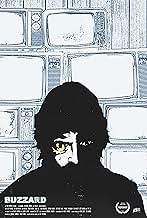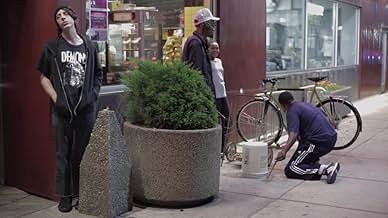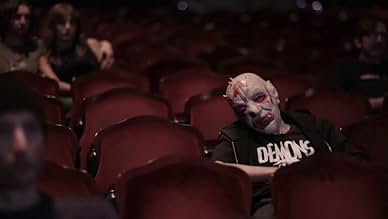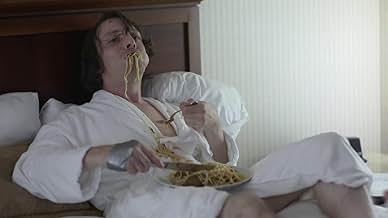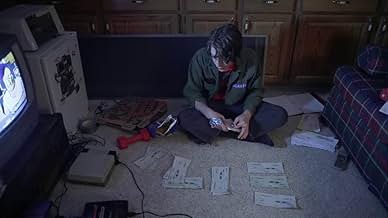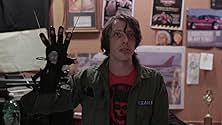ÉVALUATION IMDb
6,3/10
2,4 k
MA NOTE
Ajouter une intrigue dans votre langueParanoia forces small-time scam artist Marty to flee his hometown and hide out in a dangerous Detroit. With nothing but a pocket full of bogus checks, his Power Glove, and a bad temper, the ... Tout lireParanoia forces small-time scam artist Marty to flee his hometown and hide out in a dangerous Detroit. With nothing but a pocket full of bogus checks, his Power Glove, and a bad temper, the horror metal slacker lashes out.Paranoia forces small-time scam artist Marty to flee his hometown and hide out in a dangerous Detroit. With nothing but a pocket full of bogus checks, his Power Glove, and a bad temper, the horror metal slacker lashes out.
- Prix
- 5 victoires et 7 nominations au total
Crystal Sparks
- Maid
- (as Crystal Hilliard)
Avis en vedette
Buzzard is a good little movie, and by little I mean it looks like it was shot on an iPhone for a budget of 500$. That's not at all a bad thing. Movies like this lean on good writing, memorable acting and characters in lieu of high end production value, and grab-as-you-go energy in place of finesse.
Marty Jackitansky is a hell of a memorable character; gangly, dour, my wife went so far as to call him 'grotesque' which I think is pretty accurate. I've never seen a character like him before, and I hope I never do again. Joshua Burge gives a disquieting, subtly hilarious performance that pulls the whole tone of the film into his gravity, warping the other comic elements into something darker.
Marty Jackitansky is a hell of a memorable character; gangly, dour, my wife went so far as to call him 'grotesque' which I think is pretty accurate. I've never seen a character like him before, and I hope I never do again. Joshua Burge gives a disquieting, subtly hilarious performance that pulls the whole tone of the film into his gravity, warping the other comic elements into something darker.
"I may live badly, but at least I don't have to *work* to do it." Hitchhiker from Richard Linklater's Slacker.
The slacker, Marty (Joshua Burg), in his titular reference, Buzzard, is more socially disaffected than Napoleon Dynamite and scarier in a covert sense than Freddie Krueger. In all, this comedy drama is a witty allegory about teen anomie and an indictment of a society that constructs barriers through bureaucratic indifference.
Marty is a small time scam artist, mostly stealing checks from his temp work at a bank to trading in discarded McDonald's sandwiches from the garbage for fresh ones. All the while this metal meat head has a poster of Freddie and a glove with knives for digits. You guessed it: If director Joel Potrykus places the glove in a shot early on, chances are we'll see it later on in a far less sedentary shot.
Yet meanwhile, Marty is pulling little cons with motel room access and check kiting and generally avoiding the law. He is alternately lovable in his counterculture way and menacing when faced with authority he doesn't respect. Through most of the film, Marty is an amusing though disreputable slacker, a temp worker ripping off the bank he works for and a buddy only temporarily engaged while he thinks of his next low-level crime.
"Buzzard" should get the year's prize for the most accurate title in film. Marty feeds off the carrion of society while he literally does so in his McDonald's larcenies. Until the climax, he evades the authorities, who must by now be up to his game. Without focusing on his criminal activities, an inference could be drawn that society needs to be vigilant and proactive to help these Napoleons have meaningful lives. Otherwise, Freddie has spawned a most lethal buzzard.
The slacker, Marty (Joshua Burg), in his titular reference, Buzzard, is more socially disaffected than Napoleon Dynamite and scarier in a covert sense than Freddie Krueger. In all, this comedy drama is a witty allegory about teen anomie and an indictment of a society that constructs barriers through bureaucratic indifference.
Marty is a small time scam artist, mostly stealing checks from his temp work at a bank to trading in discarded McDonald's sandwiches from the garbage for fresh ones. All the while this metal meat head has a poster of Freddie and a glove with knives for digits. You guessed it: If director Joel Potrykus places the glove in a shot early on, chances are we'll see it later on in a far less sedentary shot.
Yet meanwhile, Marty is pulling little cons with motel room access and check kiting and generally avoiding the law. He is alternately lovable in his counterculture way and menacing when faced with authority he doesn't respect. Through most of the film, Marty is an amusing though disreputable slacker, a temp worker ripping off the bank he works for and a buddy only temporarily engaged while he thinks of his next low-level crime.
"Buzzard" should get the year's prize for the most accurate title in film. Marty feeds off the carrion of society while he literally does so in his McDonald's larcenies. Until the climax, he evades the authorities, who must by now be up to his game. Without focusing on his criminal activities, an inference could be drawn that society needs to be vigilant and proactive to help these Napoleons have meaningful lives. Otherwise, Freddie has spawned a most lethal buzzard.
This is the sort of film that kind of immediately grabs you from its opening scene, for no apparent reason really. It's not visually stunning or doing anything outrageous, it just has a very clear tone and seems to know what it's doing. The ride throughout is interesting, even if it has some parts that don't entirely work. The directing is smooth and has an off-kilter vibe that many would be proud of. I think this sort of film has the capacity to establish a real fanbase, and I wouldn't be surprised if it did. Overall, the running time also needed to be a little shorter, for such a limited story, but I recommend this uneasy, weird film.
BUZZARD follows Marty, a small-time criminal who tries to carry out various scams whenever he gets a chance. Shortly after he extends his activities to cashing other people's checks from the bank for which he works, he realizes that he is about to be caught. So he first goes into hiding in his nerdy work friend's basement, and then, as his paranoia about getting caught increases, travels to Detroit.
This movie was well-received by critics. The top critic comment, giving this a perfect score, called it a "scathing indictment of capitalism". Except, it isn't.
There certainly is social commentary here on how the capitalist system can turn people into drones dependent on the next meager paycheck, reduced to trading frivolous escapist entertainment for a higher sense of purpose, and even discharged of their empathy for less fortunate fellow human beings.
And I can see why a movie critic would think that Marty's story is an indictment of capitalism: although he is a crook, he has at times a child-like naivete which is hard to believe, and which sets him up for many of this troubles. If we squint really hard, we could argue that the capitalist system exploits this naivete to take advantage of him.
But the problem is that, as the character is drawn, his compromised ethics is not the result of being exploited by the capitalist system, but simply of him being a person with low ethical standards.
Sure, there are scenes where he speaks to his mother and lies not for personal advantage but to make sure she does not worry about him, and on one call he even makes a point to request that she tell his siblings that he loves them. These scenes certainly humanize him, and nobody questions that he is capable of love, but it does not change that, as drawn in this movie, his character would still be a criminal in a more just society, one that did not try to take advantage of him at every turn. And that is what undermines the movie as an indictment of capitalism.
It is instructive to compare BUZZARD to EMILY THE CRIMINAL (2022), a thematically very similar movie which is both better entertainment and a real "scathing indictment of capitalism": Emily's ethical standards are also lower than those of most people, but she hangs on to a fundamental sense of fairness that Marty simply lacks.
Only when this sense of fairness is violated by the Kafkaesque obstacles erected in her way by the capitalist system does she resort to crime. It really makes a huge difference in how we contextualize her situation compared to his. And I think that is exactly how it should be, because there has to be a point at which blaming the system becomes merely an abdication of personal responsibility.
The various ways by which Marty carries out his many small scams are amusing, as are various sequences of silly games he and his friend invent and play. His portrayal as a small-time crook seems naturalistic to me and may be interesting as character study. But Marty's lack of a fundamental sense of fairness made it hard for me to relate to him, and it negatively affected my enjoyment of the movie.
There is a tonal shift toward the dark when the movie goes into the third act and Marty goes to Detroit, but it didn't feel that pronounced to me because the purportedly more lighthearted earlier acts already felt uncomfortable.
The movie ends on a note of irony and takes a small surrealist turn, but I could not do much with that. This is not the kind of comedy I would normally watch for entertainment.
This movie was well-received by critics. The top critic comment, giving this a perfect score, called it a "scathing indictment of capitalism". Except, it isn't.
There certainly is social commentary here on how the capitalist system can turn people into drones dependent on the next meager paycheck, reduced to trading frivolous escapist entertainment for a higher sense of purpose, and even discharged of their empathy for less fortunate fellow human beings.
And I can see why a movie critic would think that Marty's story is an indictment of capitalism: although he is a crook, he has at times a child-like naivete which is hard to believe, and which sets him up for many of this troubles. If we squint really hard, we could argue that the capitalist system exploits this naivete to take advantage of him.
But the problem is that, as the character is drawn, his compromised ethics is not the result of being exploited by the capitalist system, but simply of him being a person with low ethical standards.
Sure, there are scenes where he speaks to his mother and lies not for personal advantage but to make sure she does not worry about him, and on one call he even makes a point to request that she tell his siblings that he loves them. These scenes certainly humanize him, and nobody questions that he is capable of love, but it does not change that, as drawn in this movie, his character would still be a criminal in a more just society, one that did not try to take advantage of him at every turn. And that is what undermines the movie as an indictment of capitalism.
It is instructive to compare BUZZARD to EMILY THE CRIMINAL (2022), a thematically very similar movie which is both better entertainment and a real "scathing indictment of capitalism": Emily's ethical standards are also lower than those of most people, but she hangs on to a fundamental sense of fairness that Marty simply lacks.
Only when this sense of fairness is violated by the Kafkaesque obstacles erected in her way by the capitalist system does she resort to crime. It really makes a huge difference in how we contextualize her situation compared to his. And I think that is exactly how it should be, because there has to be a point at which blaming the system becomes merely an abdication of personal responsibility.
The various ways by which Marty carries out his many small scams are amusing, as are various sequences of silly games he and his friend invent and play. His portrayal as a small-time crook seems naturalistic to me and may be interesting as character study. But Marty's lack of a fundamental sense of fairness made it hard for me to relate to him, and it negatively affected my enjoyment of the movie.
There is a tonal shift toward the dark when the movie goes into the third act and Marty goes to Detroit, but it didn't feel that pronounced to me because the purportedly more lighthearted earlier acts already felt uncomfortable.
The movie ends on a note of irony and takes a small surrealist turn, but I could not do much with that. This is not the kind of comedy I would normally watch for entertainment.
There is nothing about this movie I would change given the chance, and that's why I give it 10/10. I'm not sure when this movie is supposed to take place & love that it didn't matter. Marty is the gutsiest slacker on earth, taking advantage of the system everywhere he goes. The camera spends a lot of time in view of his face, which makes it all that much more apparent how withdrawn and composed he is in his scams, and effective when we notice him displaying fear & rage & doubt as things begin to close in on him. One of my favorite parts of this movie was Marty's selfish, awkward & mismatched relationship with his coworker and friend(?). Napoleon Dynamite-ish humor there. A scene where they snack of Bugles brought me to tears. Yay for junk food & horror culture. Yay for this movie. Release it to DVD already so I can show all my friends.
Le saviez-vous
- AnecdotesThe spaghetti scene was filmed in one take. The script did not call for a long shot, but director Joel Potrykus simply stood by, watching in awe, as actor Joshua Burge shoved more and more into his mouth.
- ConnexionsFeatures The Beaver Trilogy (2000)
- Bandes originalesCarmen de Proelio
Written & performed by Bog Rot
Courtesy of EHR, Inc.
Meilleurs choix
Connectez-vous pour évaluer et surveiller les recommandations personnalisées
- How long is Buzzard?Propulsé par Alexa
Détails
Box-office
- Brut – États-Unis et Canada
- 14 591 $ US
- Fin de semaine d'ouverture – États-Unis et Canada
- 8 031 $ US
- 8 mars 2015
- Brut – à l'échelle mondiale
- 14 591 $ US
- Durée
- 1h 37m(97 min)
- Couleur
- Rapport de forme
- 1.78 : 1
Contribuer à cette page
Suggérer une modification ou ajouter du contenu manquant






